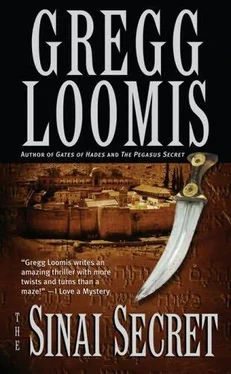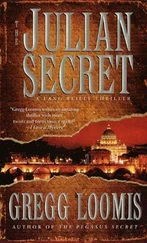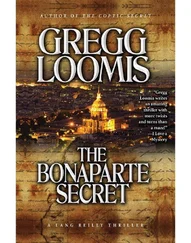Gregg Loomis - The Sinai Secret
Здесь есть возможность читать онлайн «Gregg Loomis - The Sinai Secret» весь текст электронной книги совершенно бесплатно (целиком полную версию без сокращений). В некоторых случаях можно слушать аудио, скачать через торрент в формате fb2 и присутствует краткое содержание. Жанр: Триллер, на английском языке. Описание произведения, (предисловие) а так же отзывы посетителей доступны на портале библиотеки ЛибКат.
- Название:The Sinai Secret
- Автор:
- Жанр:
- Год:неизвестен
- ISBN:нет данных
- Рейтинг книги:5 / 5. Голосов: 1
-
Избранное:Добавить в избранное
- Отзывы:
-
Ваша оценка:
- 100
- 1
- 2
- 3
- 4
- 5
The Sinai Secret: краткое содержание, описание и аннотация
Предлагаем к чтению аннотацию, описание, краткое содержание или предисловие (зависит от того, что написал сам автор книги «The Sinai Secret»). Если вы не нашли необходимую информацию о книге — напишите в комментариях, мы постараемся отыскать её.
The Sinai Secret — читать онлайн бесплатно полную книгу (весь текст) целиком
Ниже представлен текст книги, разбитый по страницам. Система сохранения места последней прочитанной страницы, позволяет с удобством читать онлайн бесплатно книгу «The Sinai Secret», без необходимости каждый раз заново искать на чём Вы остановились. Поставьте закладку, и сможете в любой момент перейти на страницу, на которой закончили чтение.
Интервал:
Закладка:
The lunch was typically British: attractively cut, nicely served, and without an iota of taste or flavor. Who but the English would put butter on a ham sandwich? As he munched what was at least fresh bread, Lang tried to remember exactly where he had placed things: Was his shave kit exactly where he had left it? Were the shirts in the dresser in the same order?
He stopped, staring at an upholstered chair. The chintz of the seat didn't match the back. He stepped to the chair, removed the cushion, and gave it a ninety-degree turn so its design was now aligned with the back. He was certain he would have noticed the aberrant pattern.
Whoever "they" were, they had found him.
But how?
And exactly what were they looking for?
He had paid cash on arrival, only slightly raising the eyebrows of a front-desk crew well adjusted to the idiosyncratic behavior of the hotel's guests. Perhaps an unspotted tail. Or…
The thought made him uncomfortable. This hotel had been his choice, what, three or four times in the last several years? In the past he had paid with the foundation's credit card. If someone's computer had traced that card number, it would have revealed where he stayed when in London.
Like it or not, the Information Age was privacy's funeral notice no matter how many people were fruitlessly trying to revive the corpse, an effort not unlike unscrambling an egg.
In fifteen minutes Lang was on the street, suitcase rattling along behind him like some dutiful animal. He visited a number of shops before reaching the block occupied by Fortnum amp; Mason. He entered, took an elevator as far as it went, took another halfway down, and walked the rest of the way to street level, exiting opposite where he had entered and hailing a roaming cab.
In London, as in most large cities, the traffic made it difficult to spot a following vehicle.
Lang directed the taxi to Knightsbridge in Kensington and from there to the Marble Arch Hotel. He was not surprised there was no doorman to greet him. Inside a lobby that was as dreary as the exterior, he waited while a platoon of Japanese tourists formed ranks behind their leader and sallied forth into the world of the gaijin, snapping pictures at every step.
A tired clerk took Lang's money in exchange for a key and explained that, on a cash basis, all room service requests would have to be paid for upon delivery. He made no offer to have someone show Lang to his room, nor was he ashamed to explain that there would be no refund were Lang to vacate before the next morning.
Named for a London landmark nearby, the Marble Arch had the worn-at-the-elbows look of a destination for tourists on a budget, traveling salesmen on commission, or a spouse on a lark. Lang's view was of a brick building perhaps five feet distant, but the room was clean and utilitarian.
He didn't intend to be there long, anyway.
He consulted a phone book and left the hotel. At the entrance he paused for a full minute, as though uncertain where he was going. He could see no one loitering in doorways, and there were few store windows to attract shoppers. A stroll around the block revealed a dark- skinned woman haggling with a greengrocer, a young mother walking twins, and a liveried chauffeur sneaking a quick smoke as he listlessly wiped the hood of a vintage Bentley free of imaginary spots.
Lang assumed he was alone.
A walk up to Knights Bridge Road took him past the part of Hyde Park known as Speakers' Corner, once the site of public executions, where the condemned were allowed to speak their minds, adding to the general entertainment before mounting the thirteen steps of the gallows. The gibbet was long gone, but the tradition of radical and unpopular speech lingered. Two men, both unshaven with long hair, were shouting at unconcerned passersby.
A block farther and he turned into a building flying the Union Jack. A small sign outside announced its function as a library. Inside, Lang stopped to whisper to an elderly man, who pointed him to the computer room.
Seated in front of the latest equipment, Lang called up Google and typed in alchemy, the quasi-scientific quest of a method of turning base metals into silver and gold. He was overpowered by the number of references. He was going to be here a little longer than he had planned.
Five hours later he only reluctantly left his machine at the prodding of the same old gentleman, this time announcing the closing of the facility for the day. Once back on the street, Lang stretched his arms and arched his back, surprised at how quickly the afternoon had retreated.
What he had thought to be simply misinformed medieval science was more, much more.
First, the practice of alchemy had its origins somewhere before Aristotle, a philosophy by which the soul or being of man could be enriched, life prolonged, and enlightenment achieved. He had tried to hurry through the purely ideological theories to spend more with the scientific.
Medieval scientists, or "philosophers," as they were called, had included no small number of charlatans, as the practice might suggest. It had, though, attracted some of the more serious minds of the time, including Roger Bacon, and Isaac Newton of falling-apple fame. Also Robert Boyle, whose observations, Lang was informed, were viable today and dealt with volume of gases. Lang was unsure what kinds, but unlikely those generated by Rachel's cooking and Mexican restaurants.
In Sir Isaac's time, the prevailing theory had been that all matter was composed of a combination of the four basic elements: fire, water, air, and earth. By correctly altering the proportions of these elements in, say, lead, gold would result.
There were scraps of writing from alchemists that seemed possibly relevant: John French, in his 1651 The Art of Distillation, described fire that would keep more than a thousand years unless its container were opened. What containers? Like the ones in Lewis's and Yadish's laboratories? Under definitions in one article, comminution Was "reduction of a substance to powder by means of heat."
There were also bibliographies numbering hundreds of volumes, books Lang would never have time to read in a lifetime, let alone before his pursuers caught up with him. He settled for four names of people who maintained Web sites concerning alchemy. He discarded the first two upon browsing their sites and finding one published a small magazine on Wiccans and alchemy. He could do without witchcraft, although his subject was only marginally more distant from the black arts. The second described himself as "sorcerer extraordinaire." Lang passed for the same reason. The third site had not been updated in over a year, and Lang's query to the e-mail address was undeliverable. The fourth, a Dr. Heimlich Shaffer in Vienna, displayed a more comforting curriculum vitae as an archeological chemist, whatever that was.
Outside the library, Lang tried the phone number given by the Web site and understood most of a message recorded in German that said he should leave a message. Lang decided against it, wondering if Wiccans and warlocks used answering devices or if astral impulse sufficed.
Once back at the hotel he called Jacob and listened to a very normal request that he leave a number. If the professor in Vienna was going to be any help, having all the facts possible was going to be necessary: Templar cathedrals, a new, or unknown, version of Exodus… Were they related, and if so, how would two scientists seeking a new energy source an ocean apart come up with the same powder that levitated and became glass and gold? The answer, if there was one, might lead him to who was trying to end the energy project and kill him in the process.
At least, he hoped it would.
He had no other means of ending a chase that had already become deadly.
The Book of Jereb
Читать дальшеИнтервал:
Закладка:
Похожие книги на «The Sinai Secret»
Представляем Вашему вниманию похожие книги на «The Sinai Secret» списком для выбора. Мы отобрали схожую по названию и смыслу литературу в надежде предоставить читателям больше вариантов отыскать новые, интересные, ещё непрочитанные произведения.
Обсуждение, отзывы о книге «The Sinai Secret» и просто собственные мнения читателей. Оставьте ваши комментарии, напишите, что Вы думаете о произведении, его смысле или главных героях. Укажите что конкретно понравилось, а что нет, и почему Вы так считаете.












